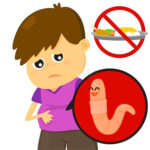In most cases, it is due to adenoid problems. By doing this, the child yawns and breathes not only during sleep but also while awake.
There is a gland behind our nose called the adenoid. Although this gland is present in our body from birth, almost everyone loses it with age. Some children have very large adenoids. Although this may not be noticeable in early childhood, some symptoms can be observed as they grow older.
When inhaling through the nose, air passes through the throat via the trachea and reaches the lungs. If the adenoids behind the nose are large, the air drawn in gets obstructed and returns, preventing necessary oxygen from reaching the lungs directly. Consequently, the body automatically opens its mouth to meet its oxygen demand.

The Risk
If a child repeatedly breathes through the mouth due to enlarged adenoids, the risk of throat infection increases. The baby’s thin palate gradually bends like a bow due to the repeated mouth-breathing. This can lead to a condition known as a ‘high arched palate’. As a result, the baby’s teeth may become unevenly spaced, and the upper gums may protrude slightly, leading to a rough dental structure.
Recommended Actions
If a child yawns frequently without apparent reason, an X-ray of the adenoid gland should be performed by a specialist as soon as possible. If the X-ray shows that the airway is significantly blocked, adenoid surgery may be recommended by the doctor.
Sometimes, the tonsils may be enlarged along with the adenoids. In such cases, the baby’s throat and nose may get obstructed on both sides while sleeping, leading to shortness of breath and snoring. This situation may require both adenoid and tonsil surgery.
An infection in the adenoids can also spread to the ears. If the ear gets infected, fluid may accumulate, causing ear pain. In such cases, microsurgery may be necessary to remove the accumulated fluid.
Many parents might think that, since adenoids usually shrink during adolescence, complex treatment is unnecessary. However, this is a dangerous misconception. The risk of physical damage to the child due to these symptoms is severe. Often, long-term antibiotic treatment is used, but if the problem persists, a minor operation is usually required. There are no complications associated with this surgery.





















